Biogeochemical Cycles
Intended Learning Outcomes
At the end of this Lecture, students will be able to
• Discuss different Biogeochemical cycles
Bio-Geo-Chemical Cycles
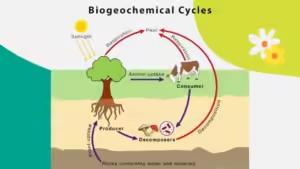
Nutrients, unlike energy are recycled in the ecosystem. The Producers of an ecosystem take up several basic nutrients from their non-living ecosystem. Materials are in limited quantity in the earth’s system and to keep the system going continuously, these materials get transformed into biomass of the producers.
Thus they are utilized by the consumer population and are ultimately returned to the environment with the help of reducers or decomposers.
The unique method that evolved in nature is recycling materials continuously by linking them in cycle changes.
This cyclic exchange of nutrient material between the living organisms & their non-living environment is called bio-Geochemical cycle.
As indicated by the name the nutrients are circulated through life (bio) and the earth (geo) repeatedly (cycle).
Hydrological Cycle
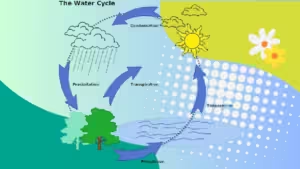
• The natural flow of water through various components of the environment resulting in the global circulation is called water cycle.
Steps in Hydrological Cycle:
• Evaporation: Surface water is heated by sun and evaporates to become water vapour, water vapour floats in the air.
• Condensation: As water vapour rises into the air it gradually cools and condenses and becomes a minute droplet of water.
• Clouds: Tiny droplets of water together form clouds.
• Precipitation: The fall of water on the earth’s surface in any form of water may be in the form of dew, drizzle, or rain is known as precipitation.
• Runoff: Precipitated rainwater accumulates and flows on the surface and sub-surface towards rivers, streams, and underground stores and ultimately reaches to sea.
• Percolation & infiltration: The process of stored water flowing under the earth, merging with the groundwater source is called percolation and infiltration
• Transpiration: The water which directly evaporates from the leaves of plants is called Transpiration.
• Completion of Cycle: All the water bodies continue their journey towards the natural slope and meet the sea where the cycle starts again.
Carbon Cycle
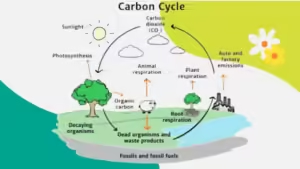
• Carbon dioxide gas is emitted from various natural and anthropogenic sources such as volcanic eruptions, burning forests, decomposition of carbonates, factories & Automobile exhausts, during respiration by humans and plants. The plants consume carbon dioxide during the process of photosynthesis.
• The major reservoirs for carbon dioxide are in oceans, carbon dioxide dissolves readily in water. On land and in water, plants take up carbon dioxide and convert it into carbohydrates during the process of photosynthesis.
6CO2 + 6H20 ———à C6 H12 O6 + 6 CO2
The plants are eaten by animals and when plants & animals die the carbon content in the organic matter again returns to the soil with the help of decomposers
Phosphorus Cycle
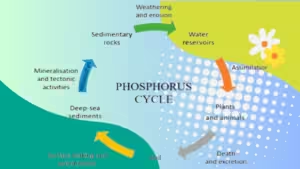
The Phosphorus cycle is the simplest of all cycles. Phosphorus is generally available in the soluble form i.e. phosphate (PO4). Which is a phosphorous atom with 4 oxygen atoms. This heavy molecule never makes it into the atmosphere, they are always present in dissolved form in water or rock. When phosphorous rock dissolves in water the phosphate goes into the solution. Producers take this phosphorous up and use it in various metabolic activities. Phosphate is considered to be an important constituent of the cell membrane, DNA, and ATP.
• Consumer obtain their phosphorus from plants they eat.
• Animals also use phosphorous as a component of bones & teeth, and shells. When animals or plants die, phosphate returns to the soil or water by the decomposers.
• Nowadays synthetic detergents & fertilizers have also become a source of Phosphates in a water course. Thus excess of phosphates due to these sources has resulted in a problem of Eutrophication. (I.e. excess of plant growth).
Nitrogen Cycle
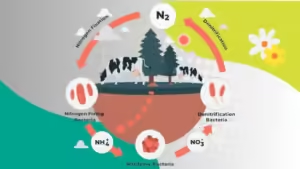
Nitrogen is present in the atmosphere as N2 in large amounts (78 %) and it is fixed either by the physical process of lightening or biologically by some bacteria like rhizobium, acetobacter and cyanobacteria these microorganisms converts elemental nitrogen into nitrates. Nitrogen in the form of Nitrates is taken up by plants and used in metabolism for biosynthesis of amino acids, proteins, vitamins etc. and passes through the food chain.
After the death of the plant and animals, the organic nitrogen in dead tissues is decomposed by several groups of nitrifying bacteria which convert them into ammonia, nitrite & nitrates, which are again used by plants. Some bacteria (denitrifying bacteria) convert nitrates into molecular Nitrogen or N2 under anaerobic conditions, which is released back into the atmosphere and the cycle goes on.
Sulphur Cycle
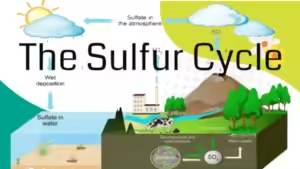
Sulphur occurs both in Free State as well as sulphides and sulphates such as PBs, ZnS, BaSO4, etc. Sulphur is very essential element for living organisms for synthesizing amino acids, enzymes, co-factors and certain vitamins. The burning of fossil fuels and volcanoes releases H2S and SO2 gas in the atmosphere, which ultimately returns to the soil as sulphuric acid along with rain, forming sulphate compounds. Sulphur in the form of SO -2 is absorbed by plants. The elemental Sulphur converted to sulphates SO4-2 is also released into the soil through the weathering of some sulphate-containing rocks.
The sulphates SO4-2 are utilized by plants and pass onto heterotrophic organisms of the food chain. After death, the bodies of plants and animals as well as their waste are decomposed by microorganisms releasing sulphur as organic sulphur bacteria. The sulphate SO4-2 is again utilized by plants and the cycle goes on.
Oxygen Cycle
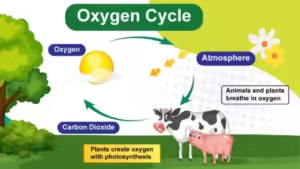
• Atmosphere contains about 21 % of oxygen. Almost all living organisms need oxygen. They use oxygen during the process of creating energy or the process of photosynthesis.
• Just as water moves from the sky to Earth and back into the hydrological cycle, oxygen is also cycled through the environment. Plants mark the beginning of the oxygen cycle. Plants produce oxygen during the process of photosynthesis. Animals form the other half of the oxygen cycle, they breathe oxygen. So the oxygen created in plants is used up by animals.
• There is a continuous exchange of O2 between the atmosphere and all water surfaces on the earth. The total amount of O2 in the biosphere is relatively constant, so the oxygen cycle may get stable.
Summary
• Nutrients are circulated through life (bio) and the earth (geo) repeatedly (cycle).
• The different Bio-Geo-bio-geochemical cycles are
•Hydrological Cycle
•Carbon cycle
•Oxygen Cycle
•Nitrogen Cycle
•Sulfur Cycle
Also, Visit:
B. Pharma Notes | B. Pharma Notes | Study material Bachelor of Pharmacy pdf